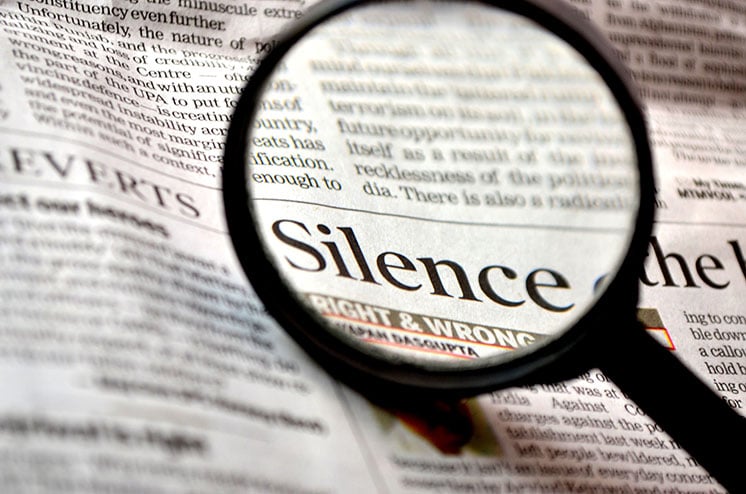The sight is all too familiar: a couple sitting in a café and staring at their mobile phones instead of engaging in conversation; two friends taking selfies and immediately posting them on social media to show their followers the meaningless details of their lives; drivers sitting at red lights to check for who knows what on their phones; individuals sitting alone seduced by the bright screen of information.
I’m guilty of it, too, of course—in those uncomfortable moments of being alone when we seek some way to avoid the demands of life. In first conceiving these thoughts, I was wary of exaggeration. Society isn’t in that bad of a shape, I told myself. But upon reflection and in really watching people, it seems sadly true. People appear to prize the portable Internet more than any chance at encounter with a fellow human being.
At this point, so much has been said and written on the dangers and pitfalls of social media and internet usage that it’s almost cliché. The Internet can certainly be a tool but, for the most part, the coupling of the mobile phone and the Internet has only resulted in further atomization. The distraction and diversion levels have led many into a burnout state of being. Yet, we absurdly continue with the same bad habits despite ourselves.
Social media or similar forms of communication were designed with the direct purpose of behavior modification through manipulation. That endless doom scrolling is no accident or bug, it’s a built-in and intentional feature—the scrolling will never reach an end. The feed is refreshed (most often with the same information presented differently), and then we repeat the process. We move our thumb up and down automatically, no matter how much we resemble automatons rather than human beings.
People rarely want to ask big existential questions, and so we distract ourselves. Why would we talk about, say, the meaning of death, when we can let ourselves be hurled into the vortex of the internet, which interestingly manipulates us into thinking that the future and our mortality do not exist?
French mathematician, philosopher, and theologian, Blaise Pascal lived a rather short life, but he made significant contributions to science and the humanities. In his famous work Pensées, Pascal devotes much attention to diversions and distractions. Written in a series of aphorisms, Pensées offers wisdom about how to live a good and happy life in concert with God.
For Pascal, certain choices we make only lead to a life of misery. Pascal himself was driven to gamble, a passion that came from his desire to use his mathematical prowess to win. Diversion or distraction leads to one kind of misery or another but it’s more complicated and paradoxical than that. In Pensées 171, Pascal writes:
The only thing which consoles us for our miseries is diversion, and yet this is the greatest of our miseries. For it is this which principally hinders us from reflecting upon ourselves, and which makes us insensibly ruin ourselves. Without this we should be in a state of weariness, and this weariness would spur us to seek a more solid means of escaping from it. But diversion amuses us, and leads us unconsciously to death.
This “death” that Pascal mentions can be taken in different ways. Certainly, some diversions are more harmful than others. We usually only speak of physical death but what about the death of the soul? Spiritual death is worse because we become something like the walking dead—unilluminated entities, with no will or desire. Distracting oneself with the internet that has no end, that is a mere “alien life form,” to use David Bowie’s words, leads to a state of being for which human embodiment does not exist.
Restlessness is part of the human condition. Now, however, we are experiencing restlessness on a level that was previously unimagined—a constant stream of information that is demanding of us to fully submit to it. Social media has tapped into this restlessness and endless dissatisfaction. Pascal’s words on the avoidance of our real selves might as well have been written today:
We do not content ourselves with the life we have in ourselves and in our own being; we desire to live an imaginary life in the mind of others, and for this purpose we endeavor to shine. We labor unceasingly to adorn and preserve this imaginary existence, and neglect the real. And if we possess calmness, or generosity, or truthfulness, we are eager to make it known, so as to attach these virtues to that imaginary existence.
Pascal’s description of this particular misery could be very easily applied to any of the social media platforms. There is a great disconnect from reality when we interact with the internet, and even when we use it as a tool. But it is rarely a tool. Rather, it is a form of manipulation and behavior modification. The absurd and sorrowful part of it is that it seems inescapable.
There has to be a way out. For Pascal, the reason we are in misery is because we are without God. Indeed, today our society is overrun with paths that always lead away from an encounter. This includes both encounters with God and our fellow human beings. To exit the cave of digital nightmares, we must be willing to take the first step and seek silence. A quote often attributed to John of the Cross is most appropriate and it speaks volumes: “Silence is God’s first language.”
It’s funny and absurd that our devices are rarely silent and are ringing with notifications, creating a constant awareness of useless information. We don’t have to make any artificial effort to turn to God. We only have to be silent.

Leave a Reply